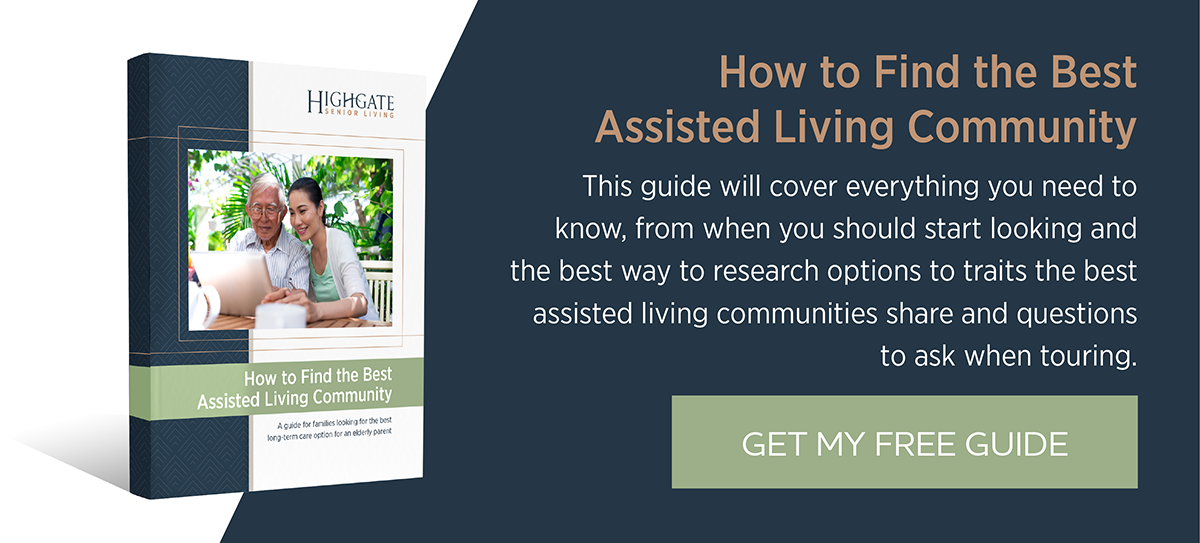
Most seniors intend to continue living in their current homes for the rest of their years, yet only 65 percent of seniors between the ages of 60 and 70 find it very easy to live independently, and among those aged 70 and older, only 43 percent find it very easy, according to an AARP survey.
Which means — unless your parents are moving in with you — the likelihood is high that they will need to transition to senior living at some point in the future.
But what does senior living mean? And how do you know which senior living option is right for your family?
Senior living is a broad term that includes everything from independent living and assisted living communities to nursing homes and dementia care communities. Here’s a look at three of the most common housing options.
Independent Living
What is it?
Independent living communities, also known as retirement communities, retirement homes, senior housing, senior apartments and continuing care communities, are places where people of similar age live together in a community that provides opportunities for socialization. In general, independent living offers privacy and the freedom to enjoy all the amenities a senior living community has to offer.
Who’s it good for?
There comes a point in life when pulling weeds, shoveling snow, or cleaning out gutters loses its charm. When the house and yard seem more overwhelming than welcoming, that’s when it’s time to think about independent living, which would allow your loved one to focus on the things they love to do rather than continuing to deal with the things they don’t. If your loved one wants to live in an active community setting, free from worries about daily chores, then independent living might be their best bet.
How much does it cost?
Rent is on a month-by-month basis, so there’s no large investment. And because health care or assistance with activities of daily living isn’t provided, independent senior living communities are often least expensive of the primary senior living options. The price ranges from $1,500 to $3,500 per month, and seniors must use personal funds to cover the cost.
Assisted Living
What is it?
Assisted living helps people stay as independent as possible while offering necessary help. It provides hands-on personal care as well as medical care for those who are not able to live by themselves but don’t require constant care provided by a nursing home or memory care facility. Typical services include staff available 24 hours a day, meals, medication management, bathing, dressing, housekeeping, and transportation. Most facilities have a group dining area and common areas for social and recreational activities.
Who’s it good for?
At some point, your loved one may need some extra help with the everyday tasks of living. Imagine how nice it would be to have your grocery shopping and cooking and laundry done for you. Assisted living is designed for these older adults who can live independently but also require some assistance.
How much does it cost?
Assisted living costs are based on a number of factors, including where your loved one lives, the level of care your loved one requires, the size of the room and the range of amenities the community offers. According to the 2017 Genworth Cost of Care Survey, the national monthly cost for a private one-bedroom apartment in an assisted living facility ranges from $573 in Vermont to $21,240 in Iowa. Most families pay for assisted living using a combination of personal savings, retirement accounts, veterans benefits, pensions, and Social Security payments. Some families also choose to sell a home to pay for assisted living.
Memory Care
What is it?
Memory care, also known as Alzheimer’s care communities and dementia care communities, offers specialized training, programs, and care for those with a memory loss diagnosis. It’s a cozy, secure environment with highly trained care partners whose mission is to understand the needs, desires, and routines of each resident in order to personalize their care.
Who’s it good for?
Memory care is a distinct form of long-term skilled nursing that specifically caters to patients with Alzheimer’s disease, dementia, and other types of memory problems. If your loved one has complex care needs associated with memory impairment, then you may want to consider memory care or an assisted living community that also includes a special care unit for persons with dementia.
How much does it cost?
Memory care costs range from $3,000 to $10,000 per month, and seniors can pay with personal funds or in some communities Medicaid. Long-term care insurance and other payer sources may also be an option.
When looking into senior living options, there are some things you should consider, including location and accessibility, social support, health care needs, and financial options.






